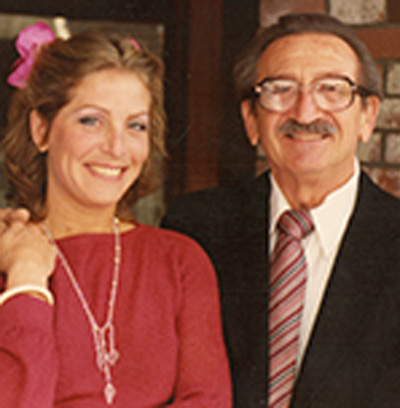A bequest in honor of a beloved father
It’s obvious from speaking with Gina Adelman that the memory of her late father Lester Rosenblum is very dear to her. Lester was born in NYC in 1914 to immigrants from an area near the Russian Polish border. Lester’s father was a fine tailor and very successful. By the time Lester was 5 years old, he was already working with his father, dipping thread into hot wax for him. Lester’s exposure to the garment industry led to his interest in the textile industry. He started his own business, supplying fabric to the garment industry in NYC.

In the early 60s, Lester moved his family from Long Island to Beverly Hills because Gina says “He didn’t feel like shoveling snow anymore.” There Lester continued his textile business, supplying fabric to the designers and clothing makers in the LA garment industry. Gina attended junior high and high school in Beverly Hills, where she didn’t have any sense of privilege because that was the only life she knew. Lester was already in his 30s when Gina was born, worked much of the time and was very easy going and patient. She says her father was of that Victorian era where he worked hard and provided for his family, but children were “to be seen and not heard.” Gina describes her father as sophisticated, intelligent, warm, caring and genuine, all qualities that stood him well in the business world and earned Gina’s admiration.
Lester first showed signs of dementia when he was in his late 70s. He couldn’t remember how to get home from the airport and would get lost going for walks in his neighborhood. He was also in a couple of fender benders. Otherwise, Gina says, he was good at covering up his cognitive decline. He never really retired and continued to go downtown to California Mart and spend time with friends.
A neurologist diagnosed Lester with multi-infarct dementia a couple of years later and said he could no longer drive his car. Life changed for him then as he was no longer independent. His diagnosis was hardest for Gina’s Mom because she was used to being taken care of by him. She relied on him for grocery shopping, pumping the gas, etc. His illness left her bereft and she didn’t know how to communicate with him. Gina says her Mom couldn’t “lie” to him, even if it would make things less difficult for him. In contrast, when Lester’s brother was placed in a residential facility, the family called it a hotel where he’d have to stay a few days.
Gina says that despite his illness, Lester remained a devoted family man, calm sweet, and humble. The family vowed to take as good care of Lester as he took care of the family. When the family could no longer care for him at home, they moved him into a residential facility. Gina would visit him daily, sitting with him during activities. She learned tools to communicate with her father through her profession as a licensed clinical social worker. She says her family could have benefited from the programs and services offered by the Alzheimer’s Association, but they didn’t know about them back then.
Lester lost his battle with Alzheimer’s in August of 1998 at the age of 84. To honor her father, Gina included a bequest to the Alzheimer’s Association in her living trust. Gina hopes for her gift are two- fold: She wants to support cutting edge research with the long term goal that there’ll be no more Alzheimer’s and she supports the growth and dissemination of information that helps families cope with the disease and care for their loved ones. She hopes that by sharing her story, she’ll create awareness, help abolish the stigma associated with the disease and others will identify with her story. But Gina’s most important goal in sharing her story is to honor her father. Gina says he was a very bright man, so it was hard for the family to accept his limitations, but Lester accepted his condition with grace and aplomb. He stayed sweet, loving and caring, the most important qualities for a father to have.